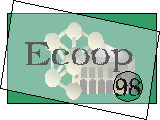
12th European Conference on Object-Oriented Programming
Brussels, Belgium, July 20 - 24, 1998
 |
12th European Conference on Object-Oriented Programming |
Tutorial T15 |
| Organizers: |
Mehmet Aksit The TRESE project, University of Twente Department of Computer Science Enschede, The Netherlands |
| Day: | Tuesday afternoon |
| Level: | Advanced |
| Room: | C403 (5th floor) |
Straightforward mapping of requirement specifications to object-oriented models is not sufficient; to obtain, robust, adaptable and reusable software systems, first a high quality software architecture must be developed and then the architecture must be mapped into object-oriented models.
This course teaches application, software, productline and system architectures. The following design issues are considered: identification and definition of
architectural components, integrating various architectural styles, compromising adaptability, reusability and performance issues, and possible problems in mapping architectures to object-oriented models. The applicability of
these techniques is explained using practical examples.
Dr. Aksit is working as an associate professor at the University of Twente. He is the leader of the Twente Research and Education on Software Engineering (TRESE) project. He is a consultant for several companies. He was the program co-chair of the ECOOP'97 conference. He has been serving as a program committee member of various international conferences and he was the tutorial chair of the ECOOP'92 conference.
He gave many international and in-company courses in the Netherlands, in other European countries, USA and Canada, and at the ECOOP'91, OOPSLA'92, ECOOP'95 and ICECCS'95 conferences.
Dr. Aksit has been the user and developer of object-oriented systems since 1983. He is specialized in the application of object-orientedmethods to practical software systems. He was involved in designing architectures for several large projects. Together with the members of his project, he has introduced composition-filters, atomic delegations, associative inheritance and delegation mechanisms, abstract communication types and fuzzy-logic based object-oriented methods. He has identified and defined a set of new problems related to object-oriented analysis and design. These concepts and techniques have been published in various papers. His areas of interests are object-oriented architectures, analysis and design ofindustrial software systems, object-oriented CASE tools, programming environments, and languages.